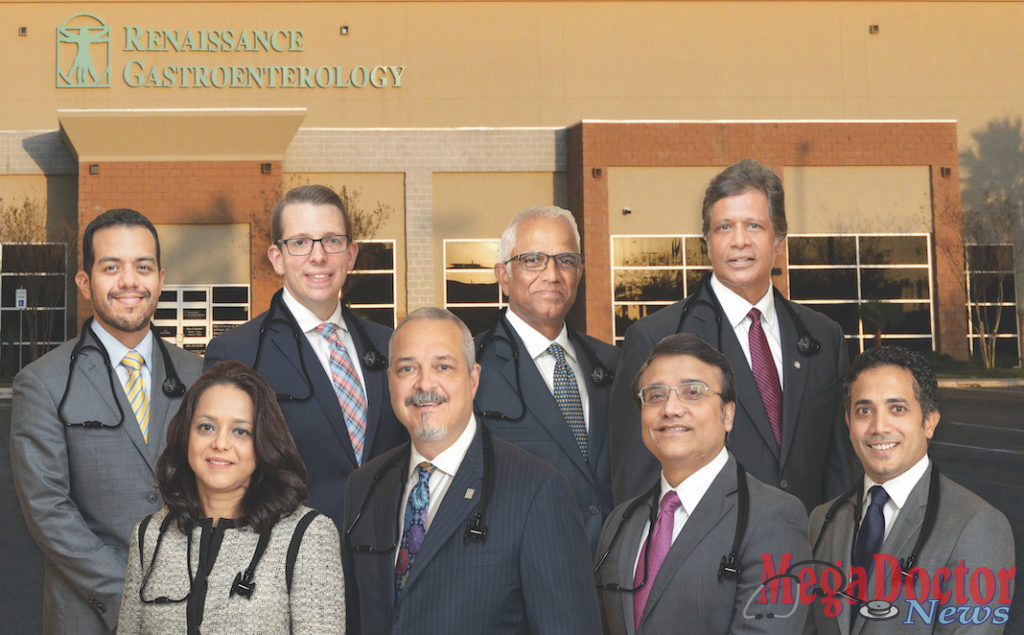
As originally published by Mega Doctor News in its newsprint edition March 2020
By Roberto Hugo Gonzalez
There are many questions about any health topic, especially on how to prevent colon cancer. For that reason, we had the pleasure and privilege of talking to six of the finest gastroenterologists at DHR Health Gastroenterology Institute.
The message was consistent, and the word prevention was used throughout the conversation. They all agreed it is easier to prevent this type of cancer today than ever before.
It is unusual to have access to multiple physicians eager to answer questions. We asked, what is colon cancer? What are the symptoms to look out for? When do I need to worry? Or When do I need to call my doctor? The most important message conveyed by the physicians is that the general public should get screened to prevent colon cancer.
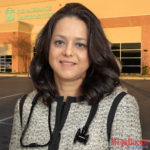
Dr. Ingrid Chacon was the first to express how vital prevention is. She is a gastroenterologist and has practiced in this field for the last thirteen years. “Colon cancer is a highly preventable disease before any symptom shows.”
Dr. Chacon stressed the importance of the screening because once colon cancer spreads out, it might present challenging scenarios. Also, she said, “It might also require multiple steps to cure the disease, including surgery, chemo, and radiation therapy.”
March is Colon Cancer Awareness month. The gastroenterologists at DHR Health Gastroenterology Institute came together to remind everyone of the way of prevention through a simple screening procedure.
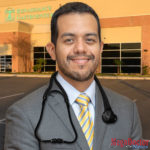
Dr. Henry Herrera agrees. He is a gastroenterologist treating cases of abdominal pain, gastritis, irritable bowel syndrome, colitis, and peptic ulcers in adults. He also provides endoscopic ultrasound (EUS) and endoscopic retrograde cholangiopancreatography (ERCP), which combines upper gastrointestinal (GI) endoscopy with x-rays to treat problems with the bile and pancreatic ducts.
His message is that younger people are now the target for colon cancer. He said, “It used to be that 50 years of age and up was the guideline, today it has dropped to 45.”
Dr. Herrera said the rate of colon cancer had been steadily declining among patients over 50 years of age. “But in those younger than 50, it has been going up steadily over the past ten years.” He explained that the American Cancer Society made a recommendation in 2018, to decrease the age of when to start screening to 45 years of age.
He said the type of cancer that younger patients are getting is more aggressive, with symptoms like bleeding and abdominal pain. “So, I would say that younger people are not immune to colon cancer,” he said.

The Rio Grande Valley has been a magnet for brilliant physicians who have graduated from the best universities on the planet. Some of them have worked in different countries before setting up their practice in South Texas. Such is the case for Dr. S. Murthy Badiga. He is a board-certified gastroenterologist and has lived in the Valley for the last twenty-five years. Before making his residence here, he lived in Canada, Holland, Jamaica, and the West Indies, to name a few.
Dr. Badiga says that colon cancer is beatable. “It is one of the most treatable cancers. So, I would say it is treatable, beatable, curable, and preventable,” he declared.
There are about 150,000 cases a year of colon cancer. “Unfortunately, 50,000 still die, but that means 100,000 people are saved even after receiving their diagnosis,” he said.
“Besides,” he said, “It is less threatening than some of the other cancers such as pancreatic cancer, esophageal cancer, and stomach cancer. So yes, colon cancer is curable, and pretty much treatable. But the key is that it’s eminently preventable.”
The screening process is called a colonoscopy. It is a simple and painless procedure. The same day it is done, you can go home and wait for the results.
Dr. Badiga brought two questions to our attention; what are the treatments? What are the side effects to the treatments?
He said that if it is colon cancer, the classification is based on what is called Dukes’ classification of the depth of penetration. He explained, “If it is limited to the inner lining guard, the mucosa of the colon, then it’s a stage A.” He continued, “If it goes into the muscle, the wall of the colon is a B. If this gets out of the wall into the tissue, around the colon, and into the lymph nodes, it’s a C. If it goes to distant organs, like the liver, it’s a D. So, the treatment typically depends on what you find.” He pointed out that if it is C or D, chemotherapy sessions may be needed.

Dr. Asif Zamir, FACG is another member of the Gastroenterology Institute division of DHR Health. He has been in the Valley for twenty years and has acquired vast experience in interventional and advanced endoscopic procedures, especially ERCP’s. He is also the GI Fellowship program director, who is currently training two fellows, and future gastroenterologists.
Our first question to Dr. Zamir, what does it mean to have colon cancer? “Well, obviously, it is devastating; it is a deadly disease.” He continued, “It brings anxiety to the patient and the family as well. But there is hope for the patient if the disease is caught in the early stages because it is curable.” He added, “That is why the screening is important.” Dr. Zamir urges early screening for all his patients.
He said that in the world, there are 1.8 million people diagnosed with colon cancer every year and in the U.S., there are close to 150,000. Once a patient is diagnosed with colon cancer, treatment must start immediately. Dr. Zamir follows up to read the biopsy report and this leads him to meet with the pathologist. Then a CT scan of the abdomen, pelvis, and sometimes even the chest is part of the process.
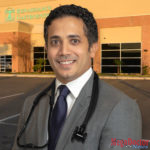
Dr. Rama Behara is another gastroenterologist with a passion for serving his patients. His father, Dr. S. Behara, is also a gastroenterologist, working together with the same team of medical professionals. He has been in this market for the last forty years. He said that the fact that he gets to work with his father is a blessed situation for him.

“I was always fascinated with gastroenterology and the idea of utilizing procedures to help diagnose and treat cancers,” he told Mega Doctor News. “A lot of people are fearful about the idea of bleeding and finding blood in the stool.” He said, “We understand that there is risk associated with bleeding, and the risk of cancer. We don’t take it lightly.”
Dr. Behara pointed out that their approach is serious and aggressive in fighting cancer. When asked if we were winning the battle against cancer, he said, “We’re not winning yet, but we have accomplished milestones.” He continued, “The Colon Cancer Awareness Foundation and Colorectal Cancer Alliance have always pushed for an 80% screening rate of the population getting screened for colon cancer. Today, we are about 60 plus.”
He said there’s still room to improve. That is why DHR Health and Renaissance Gastroenterology are reminding the South Texas community about the importance of screening early. They’re using Colon Cancer Awareness month as an opportunity to remove the stigma that is preventing younger adults from getting screened.
Dr. Behara said, “There’s always the fear of the unknown. People often will have different reasons for not going to get checked.”
In the meantime, he said, half of the population under 50, which is considered the younger people, are developing problems at younger ages. “The stigma that you don’t get it if you are young is one of the myths or falsehoods.” So, there you have it, from one of the younger gastroenterologists at DHR Health.
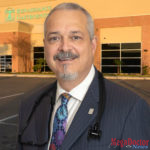
But if there is someone who can tell you about colonoscopy, polyps, his stigma, and the astonishing feeling of finding himself with a diagnosis of color cancer, it is Dr. Carlos J. Cardenas.
Dr. Cardenas is also Chairman of the Board and Chief Administrative Officer at DHR Health. He is a twenty-year experienced gastroenterologist that doesn’t hide what he went through when he was diagnosed.
“I am a colorectal cancer survivor. I am alive today because I went and had a colonoscopy screening done.” He said, “This last February, it was nine years since I had my surgery. It saved my life. Need I say more?
He said that his problem was found in time, and it was asymptomatic. “I had no symptoms at all. Had it not been for this screening, I don’t know that I’d be sitting here.”
Dr. Cardenas is very passionate about telling his story to everyone, including his colleagues, because if it can happen to him, it can happen to anybody. It also can save a life.
“If you want to talk about irony? This is ironic. I’m a gastroenterologist. That’s what I do.” He said, “So it’s about preaching the gospel, of getting a screening and not only preaching it, but doing it. As I say, walking the talk and doing it.”
When he heard the word cancer, he tried to wrap his head around it. “It was devastating for me, for my children, and my wife,” he said.

Dr. Cardenas had many questions; how far along was it? Did we catch it in time? Can I have surgery? And will it take care of it?
Fortunately for him, it was caught in time. Yes, the surgery helped, and it took care of it. Now, he smiles and tells the story as if it happened just today. That is why he is so passionate about telling the general public to screen.
The DHR Health Gastroenterology Institute is a medical facility with dedicated gastroenterologists that are well trained and experienced in their field which are also in a race to “Wipe Out Colon Cancer.” This effort consists of bringing educational information designed to raise awareness during Colon Cancer Awareness Month and remind people that colonoscopies are the most effective way to reduce the risk of colorectal cancer. The Inaugural Wipe Out Colon Cancer 5K that DHR Health planned for March will be postponed to a date later this year.
For more information about DHR Health Gastroenterology Institute and a complete list of physicians please visit https://dhrhealth.com/services/gastroenterology. To schedule a colonoscopy call (956) 362- ENDO.
Written by Roberto Hugo Gonzalez, the 2009 SBA Journalist of the Year award winner and a 2009 and 2012 Paul Harris Fellow award recipient.









